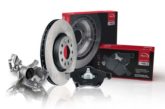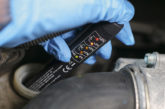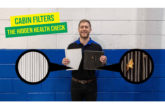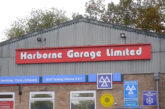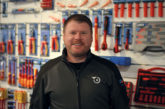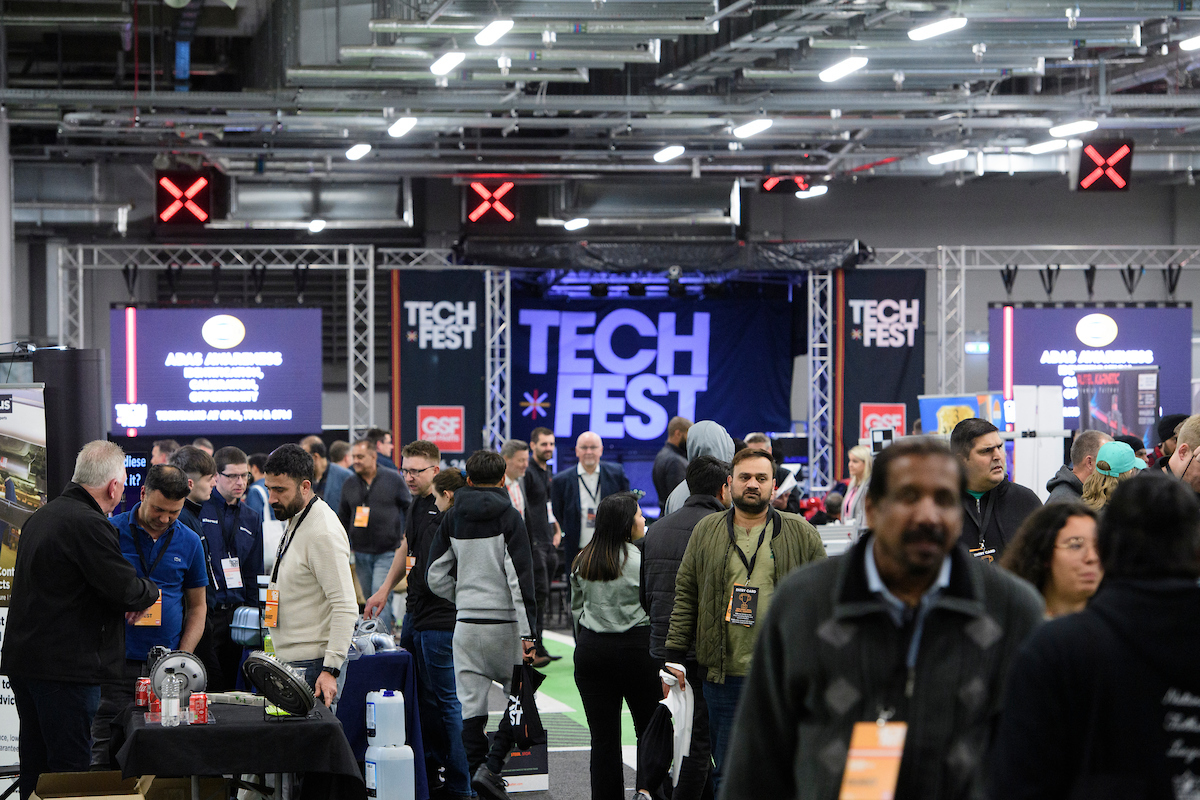
Although it may seem unbelievable now, this time last year serious doubts hung over the future of GSF in the aftermarket. Early last year, its parent company Uni-Select was acquired by LKQ, whose ownership of Euro Car Parts meant it had to divest GSF. Step in the charismatic founder of Euro Car Parts, Sukhpal Ahluwalia, whose investment and experience has seen a reinvigorated GSF go from strength to strength in 2024. First on the docket was appointing another ECP heavyweight, Steve Horne as CEO, who confidently announced at the time that “we will turn the business into a fast-growth, sales-focused company”.
At GSF’s debut TechFest event, a lively evening bringing tech talks alongside free food to nearly 2,000 branch staff and garage customers from the London area, PMM editor Kieran Nee managed to sit down with three members of the GSF senior team for a quick chat about the event, how the motor factor is adapting to a changing landscape and what it plans for the near future.
PMM spoke to Sukhpal Ahluwalia, executive chairman, Steve Horne, CEO and Martin Gray, chief people officer at Techfest Wembley.
Sukhpal, you’re returning to the independent aftermarket after a time away. Are you excited to be back?
Sukhpal Ahluwalia, executive chairman: Well, the proof is in the pudding – you can see out there [points to the TechFest main area] that we’re clearly doing things differently. There’s a lot of excitement out there. It’s good for the business.
Industry standards are being raised and the competition has been extremely worried and you know, of course, the whole thing is raising the bar in the industry. Everyone takes it more seriously.
You’ve spoken in the past about the importance of seeing an opportunity and taking it. What was the opportunity you saw with GSF?
SA: Fundamentally it was a good company. It had been in the hands of a number of owners in the last 10 years, I think about 3 or 4 owners, and it had been through so much turmoil at the management level. So the decisions weren’t really long term. You could see that everything was short term and just to show good paper profit. There was a lot of scope and opportunity to make things better.
We’ve identified it and if you look at what we’ve done in the last seven, eight months, it’s phenomenal. They haven’t done this in the last 10 years.
Do you relish the challenge?
SA: Always. If there’s no challenge, there’s no need for me. A steady-Eddy business has no need for me. We like a challenge and we like to take things from the slow lane into the middle and then into the fast lane. I think we’ve already taken GSF from the slow to the middle lane and – once we’ve got all of our infrastructure fixed in terms of IT, warehousing, people and the other enhancements going on – it’s totally moving into the fast lane.
With new technologies, what new challenges are there that GSF has to contend with?
Steve Horne, CEO: I think the fundamental basics of the aftermarket are the same. I think the customers want the same. They are offering a service to their customer and they need a supplier who is going to support their business. Cars have got a little bit more technical, so there’s a little bit more technical work to do.
As I said in a recent article on PMMOnline, resourcing the industry is tough and trying to recruit that new resource in. Lots of people are looking at different ways, but it’s definitely a threat to the industry. But I think the fundamentals of servicing the customer and wanting a supplier to do that are exactly the same as they were.
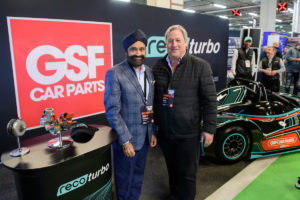
So even with EVs, ADAS, autonomous vehicles, fundamentally, your role within the aftermarket pretty much stays the same?
SH: It does, you know, we might offer new products and new solutions, but our role as a distributor and a partner to the garage is exactly the same.
We’ve got to make sure that the independent garages have the right tools to be able to service their customers and to maintain their reputation in the market. We’ve got to offer a quality service at the right price and that’s what our focus is. One of the messages Sukhpal hammers into us throughout the business is that the customer is king. Any decision we make centres on supporting the customer and if it’s not, and it’s not moving the needle, we don’t do it.
SA: One of our main strategies here is to really align ourselves with the independent garage. Our focus is the professional motor mechanic workshop, the independents.
And does that mean things are less corporate at GSF, more down to earth?
SA: Well, we are the only company now that is British, independent and entrepreneurial. I mean, the other two leading players, or the bulk of the market, are all controlled quarter-by-quarter and the bosses are sitting across the Atlantic. That’s the difference.
Martin Gray, chief talent officer: We’re a great believer in the independent, bearing in mind they will service any car: they will look after the family, the extended family and the individual. I think that trust [between garage and customer] is what we’re trying to tap into. Your point about being less corporate – that isn’t code for not being professional or not having integrity and the best processes, it’s about being nimble and agile and just listening to our customer. That ties into, in terms of my role, looking after the people and the recruitment.
Generally a lot of people are joining us because they’re managed through, perhaps, a spreadsheet or a KPI – and there’s a place for some of that – but that’s predominantly how everything is done and decisions are made which locally do not make sense, because they’re taken from a centre or a boardroom. I think for us, the next two years, the next five years are about, how do we not take ourselves too seriously.
We’re passionate, we want to do it right, but let’s put ourselves in our customer’s shoes. They’re not overly worried about the wider demographics and the macro make-up of Wall Street-owned businesses. They just want the things that they want. So to answer your question, we generally see an opportunity to keep it simple: we’re keeping it simple, keeping it honest, keeping it real and that’s a hell of an achievement.
Do you spend much time getting into garages, meeting the end user?
MG: We all spend a lot of our time as a senior team in garages and in branches. We don’t have officers, we don’t have PAs or executive suites, but we love it – Sukhpal didn’t need to come back, but it’s in our DNA and I think the customers feed off that.
SH: Next week we have the top senior managers in the business out for three days, visiting over 60 branches, across the UK. This will be the second time this year we’ve done it. I’m a firm believer that if we’re going to sit in a room and make a decision we’ve got to understand the impact on the customer and the branches. If you’re not out understanding them and the issues, you can’t make those decisions.
MG: We will be on the phones, ringing up customers and looking up car parts and so we’re not sitting at a distance thinking “what is it really like out there?” But we don’t do this for effect, we don’t actually shout about it. A lot of businesses have, I think, lost the essence and the point of what they’re really doing and because of Sukhpal’s 45-year background, he’s never lost that. Today, I’ve only been five minutes with Sukhpal and we’ve had 12 people who have known him thoughout the years coming up to him in just that five minutes and that comes through… no disrespect to our competition, but they don’t have that! The connectivity for us is very tight.
It sounds like you’re taking a people first approach. How does TechFest fit into that?
SH: It’s about us connecting with the customer. It is about providing an added value solely for the customer, but more than anything, we can connect. And that is what the event is for.
So the three of you will be milling around for the evening?
SA: All night. All of us have been behind the scenes planning, we’ve literally immersed ourselves. And this is the first of many, this is a pilot. At the end of this, we will do a full recap and see what we need to do more of, or less, and you’ll see this replicated in the centre of the country, the northeast, northwest… So yeah, more of these. I think the general idea is really to bring all our partners here – they’re all here, and they’ve got new technology, new software and training opportunities. They’re here to make our customers aware and enable them.
Sometimes they’re not even aware, they work seven days a week and nobody visits them. So this is a good opportunity. There are wonderful cars, which everyone loves, there’s music, there’s gorgeous food and drink – I mean, it ticks all the boxes, it’s going to be great.
Sukhpal, I understand some of the cars out there are your own cars. How many cars have you got here today?
SA: Probably about 14 or 15. So most of the classics are all mine here, because I really specialise in mid -50s to early 70s, that’s where I stop.
I did see a lovely silver Mercedes out there which caught my eye. I assume that was one of yours.
SA: Yes it was. And, you know, these cars, as long as it’s dry on the roads, I use them all the time here. Either with my kids or with my friends, they come and jump in the car and we go for coffee runs. We just go to some random place, six miles or so, have a coffee and come back.
So behind what you do there is a passion for cars.
SA: Absolutely, it’s in the blood, it’s my DNA and it’s the easiest thing for me. I have a huge business in property and AI and lots of other industries, but my heart is really connected here. This really gets me high and sometimes gets me low as well. It really evokes the extremities of your human emotions, you know.
Just one final question, with the cost of living, have you noticed garages opting more for aftermarket parts?
SA: I think on the whole they just want to fit parts to people’s cars that are not going to let their customers down and I think they rely on us to guide them. We have, very often Good, Better, Best scenarios to offer to customers. Often it’s the brands they trust. We give them the options and they make the decisions.
I’m proud to be part of an industry that really tries its best to enable the mobility of society at affordable pricing. I feel good about it because when people tell me, “I came to your shop, I bought four shock absorbers for £120 and the Mercedes dealer had quoted me £460. I nearly scrapped my car,” you feel that you’re doing something worthwhile.
SH: And in this economic environment, you tend to find more people go into the aftermarket out of the dealerships.
SA: Absolutely. Look, our competition at the moment is up 2%, 3%, right? We’re up 22%. There’s something that we’re doing right!
For more information about GSF click here.

